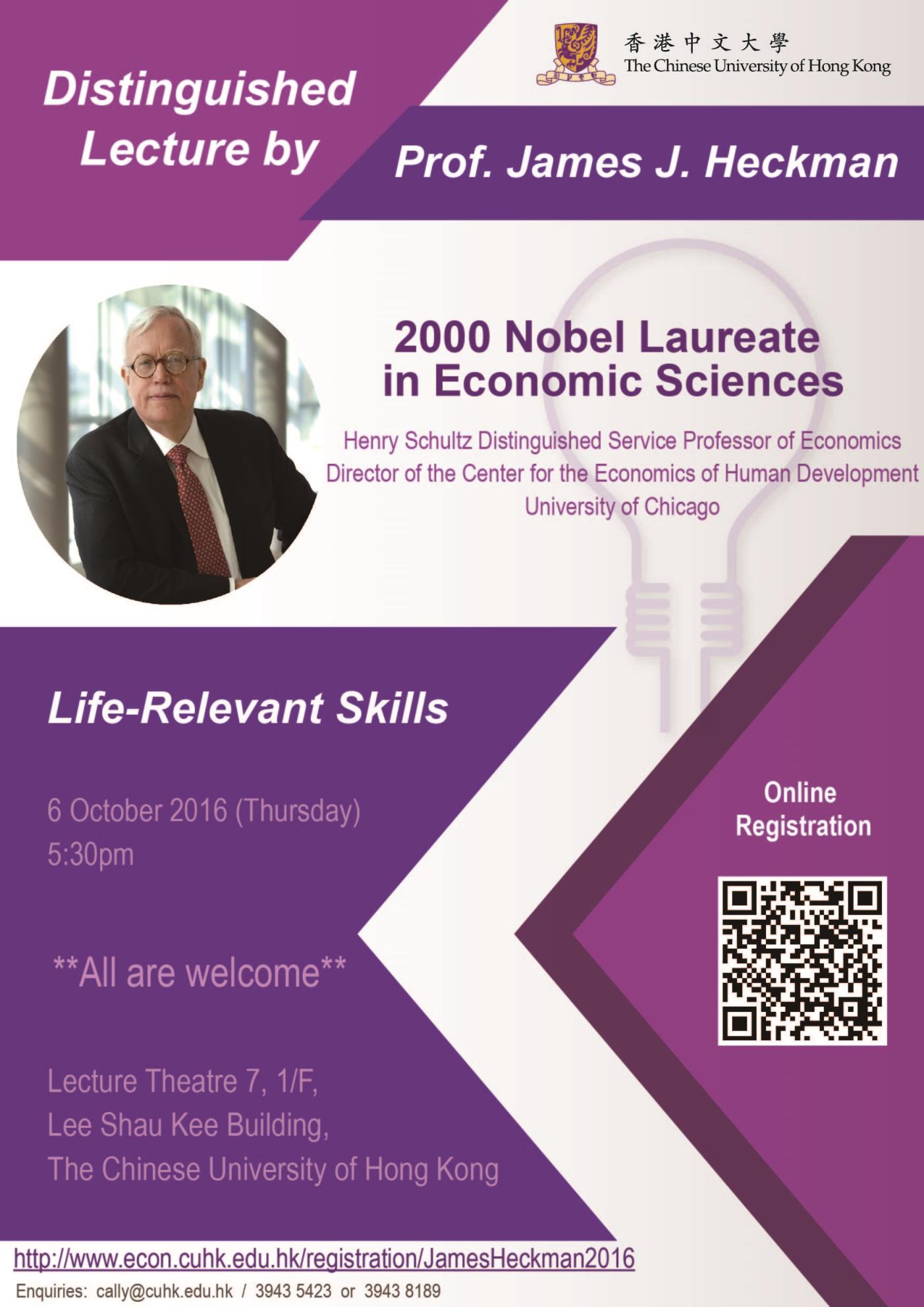Events
Distinguished Lecture by Prof. James J. Heckman: Life-Relevant Skills
6 Oct 2016
5:30pm – 7:15pm
Lecture Theatre 7, 1/F, Lee Shau Kee Building, The Chinese University of Hong Kong
Prof. James J. Heckman
Biography
James J. Heckman
2000 Nobel Laureate in Economic Sciences
Henry Schultz Distinguished Service Professor of Economics
Director of the Center for the Economics of Human Development
University of Chicago
James J. Heckman is the Henry Schultz Distinguished Service Professor of Economics and Director of the Center for the Economics of Human Development at the University of Chicago. He has devoted his professional life to understanding the origins of major social and economic questions related to inequality, social mobility, discrimination, and the formation of skills and regulation in labor markets, as well as to devising and applying economically interpretable empirical strategies for understanding and addressing these questions. While his research is rooted in economics, he also actively collaborates across disciplines to examine all aspects of major problems. His recent interdisciplinary research on human development and skill formation over the life cycle draws on economics, psychology, genetics, epidemiology, neuroscience, and law to examine the origins of inequality, the determinants of social mobility, and the links among stages of the life cycle, starting in the womb. This work has influenced both the scholarly literature and public policy.
Heckman has a B.A. (1965) in Mathematics from Colorado College and an M.A. (1968) and Ph.D. (1971) in Economics from Princeton University. He has been at the Department of Economics at the University of Chicago since 1973. He was one of the founders of the Harris School of Public Policy, where he also has an appointment. Since 1991, he has been a research fellow at the American Bar Foundation. In 2010, he cofounded the Human Capital and Economic Opportunity Global Working Group, a global network of over 400 scholars working on aspects of measuring and addressing problems of inequality and economic opportunity. In May 2014, he launched the Center for the Economics of Human Development at the University of Chicago, a center dedicated to rigorous empirical research on the economic foundations of life cycle inequality, which he also directs.
In 2000, Heckman won the Nobel Prize in Economics for his work on the microeconometrics of diversity and heterogeneity and for establishing a sound causal basis for public policy evaluation. He has received numerous other awards for his work, including the John Bates Clark Medal of the American Economic Association in 1983, the Jacob Mincer Award for Lifetime Achievement in 2005 from the Society of Labor Economics, the 2005 and 2007 Dennis Aigner Award for Applied Econometrics from the Journal of Econometrics, the Ulysses Medal from the University College Dublin in 2006, the 2007 Theodore W. Schultz Award from the American Agricultural Economics Association, the Gold Medal of the President of the Italian Republic, awarded by the International Scientific Committee of the Pio Manzu Centre in 2008, the Distinguished Contributions to Public Policy for Children Award from the Society for Research in Child Development in 2009, the Frisch Medal from the Econometric Society in 2014 for the most outstanding paper in applied economics published in Econometrica in the previous five years, and the 2016 Dan David Prize. He is a recent recipient of an NIH MERIT award.
Heckman is a member of the National Academy of Sciences, USA; a resident member of the American Philosophical Society; a fellow of the American Academy of Arts and Sciences; a fellow of the American Association for the Advancement of Science; a fellow of the Econometric Society; a fellow of the Society of Labor Economics; a fellow of the American Statistical Association; a fellow of the International Statistical Institute; and a member of the National Academy of Education. He has received numerous honorary degrees, and is a foreign member of several international scholarly bodies.
He is currently a co-editor of the Journal of Political Economy. He has published over 300 articles and 9 books. His most recent book is The Myth of Achievement Tests: The GED and the Role of Character in American Life (University of Chicago Press, 2014). He is actively engaged in conducting and guiding empirical and theoretical research on health, skill development, inequality, and social mobility over the life cycle in both mature and developing regions.
Email: cally@cuhk.edu.hk
Tel: 3943 5423 or 3943 8189
Asian societies place great value on the scores on achievement tests like PISA exams. Many also place great value on IQ scores. This lecture summarizes frontier research in psychology and economics to demonstrate the very limited value of such tests in predicting a variety of life-relevant outcomes. More predictive measures of life-relevant skills are discussed. A framework for evaluating measured skills as strategies in response to incentives in situations is presented. Frontier methods challenge and enhance traditional approaches to evaluating students, schools, and entire societies.


